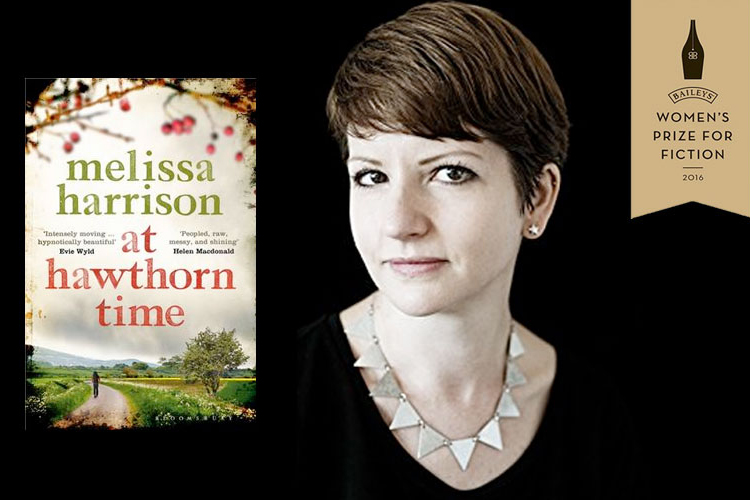From the Women’s Prize Archives.
Ahead of next week’s 2016 Baileys Women’s Prize for Fiction shortlist announcement, we caught up with Melissa Harrison, longlisted for At Hawthorn Time. Read on to find out how she weaves nature into her work and why having a specific ‘writing space’ at home can be limiting.
Where did the inspiration for At Hawthorn Time come from?
How an idea takes root and grows is a mysterious process – to me at least! A few different things were going on at the same time, I think: a friend’s marriage was ending, a neighbour was involved in a car accident, and I was very moved by reading newspaper interviews with Stephen Gough, a gentle soul who is sometimes known as the ‘naked rambler’. I was also spending a lot of time in Shropshire, visiting my parents-in-law, and that provided the location for the book.
Your work explores the connection between fiction and nature writing – when did you first start experimenting with this and why?
It wasn’t deliberate. Initially I thought I wanted to write non-fiction, though I wasn’t sure quite what; certainly, the idea of writing a novel was far too scary. My first book, Clay, began as a series of sketches: descriptions of urban wildlife and urban living that somehow coalesced into a story. Now I don’t really know how else to write: the natural world, and how people and communities relate to it, is what moves me: it’s what I need and want to explore.
Are there any authors who particularly influenced you while writing this novel?
I was reading a lot of the poet Edward Thomas, from whose poem ‘Lob’ the title of the book came; there’s some John Clare in there too, and Oliver Rackham’s fascinating The History of the Countryside, and probably a dash of Ronald Blythe’s Wormingford books. I read more of what’s broadly termed ‘nature writing’, both new and old, than I do contemporary fiction, and that also tends to seep in.
You’re a nature writer and photographer as well as a novelist, yet you’re a Londoner – how do you reconcile living in a city with your love for nature?
It’s a misconception that cities are nature-poor – in fact, London is an astonishingly good place to see wildlife! The world we each live in is made up of what we choose to focus on – the more you notice the natural world the larger it looms, and the greener and more beautiful your world becomes. I have a dog, Scout, and walk her daily; there’s more nature in my day-to-day life than in some of my friends’, who live among improved pasture and intensively farmed fields. Having said that, I do dream of living somewhere really rural one day – just not quite yet.
Do you have a particular place where you like to write?Your work explores the connection between fiction and nature writing – when did you first start experimenting with this and why?
It wasn’t deliberate. Initially I thought I wanted to write non-fiction, though I wasn’t sure quite what; certainly, the idea of writing a novel was far too scary. My first book, Clay, began as a series of sketches: descriptions of urban wildlife and urban living that somehow coalesced into a story. Now I don’t really know how else to write: the natural world, and how people and communities relate to it, is what moves me: it’s what I need and want to explore.
Are there any authors who particularly influenced you while writing this novel?
I was reading a lot of the poet Edward Thomas, from whose poem ‘Lob’ the title of the book came; there’s some John Clare in there too, and Oliver Rackham’s fascinating The History of the Countryside, and probably a dash of Ronald Blythe’s Wormingford books. I read more of what’s broadly termed ‘nature writing’, both new and old, than I do contemporary fiction, and that also tends to seep in.
You’re a nature writer and photographer as well as a novelist, yet you’re a Londoner – how do you reconcile living in a city with your love for nature?
It’s a misconception that cities are nature-poor – in fact, London is an astonishingly good place to see wildlife! The world we each live in is made up of what we choose to focus on – the more you notice the natural world the larger it looms, and the greener and more beautiful your world becomes. I have a dog, Scout, and walk her daily; there’s more nature in my day-to-day life than in some of my friends’, who live among improved pasture and intensively farmed fields. Having said that, I do dream of living somewhere really rural one day – just not quite yet.
Do you have a particular place where you like to write?
I try not to fetishize my writing area too much; I find that it closes down opportunities for writing, as it becomes too easy to tell myself I can’t because my surroundings aren’t right. I have a desk in my bedroom at home, and I sometimes write on my laptop on the sofa; if I get stuck I’ll switch to a notebook and pen, which can feel liberating – more like scribbling notes than ‘proper writing’.
I try not to fetishize my writing area too much; I find that it closes down opportunities for writing, as it becomes too easy to tell myself I can’t because my surroundings aren’t right. I have a desk in my bedroom at home, and I sometimes write on my laptop on the sofa; if I get stuck I’ll switch to a notebook and pen, which can feel liberating – more like scribbling notes than ‘proper writing’.








